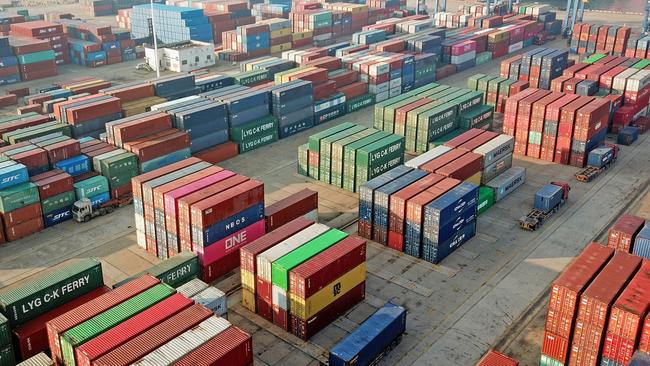Global supply pressures are easing after pandemic chaos
Supply chain constraints are not over but companies are managing them. One of the biggest users of volume containers, Associated British Foods, says disruption has been a lot smoother.

The Baltic Dry Index is anything but an arid subject for economists and investors trying to second-guess the direction of world trade and commerce.
It measures the price of shipping bulk materials around the world and as such is used as a proxy to measure the stability and efficiency of worldwide supply chains. In times of market dislocation, it rises sharply to reflect the difficulties in transporting goods — and during the pandemic it has done little else but rise, peaking at more than 5700.
That was reflected in everything that the corporate world was telling us: the scramble to source goods and materials meant that shipping rates had become extortionate, exacerbated by problems at ports as everything arrived at once or didn’t turn up at all. Fleets of the largest vessels were parked off San Francisco Bay; the Port of Felixstowe was warning that Christmas may be cancelled. Supply chains in a globalised economy were failing.
That peak in the Baltic Dry was hit on October 7. Then the index fell sharply, halving within a month. Though it jumped in the run-up to Christmas, it has dropped back again since. Yesterday it fell further, its tenth consecutive daily decline, to 1570. To put that in context, that puts the index back only to February 2021 levels but not completely out of kilter with the average over the past decade. It indicates not only that things are a lot better than they were only three months ago, but also that the great supply chain crisis may be over.
And that seems to be the message in the present season of end-of-year and quarterly trading updates from British corporates, which have included positive statements about some of the earlier obstacles and news of which has been accompanied by rising share prices.
Wincanton, the logistics, trucking and delivery company, is by its nature at the epicentre of the British supply chain, putting the goods in shops that consumers want to buy. Its trading update led to its shares rising by 13.2 per cent, or 46 British pence, to 395p, but only back to levels seen at the beginning of the northern autumn.
But its upbeat message was more nuanced than simply that goods are moving again.
It said that less volatility meant that better decisions could be made. Fearful stories of driver and labour shortages and Brexit border blockades were understood and managed.
It is also reaping the benefits of digitalisation, the shift to e-commerce, of preparation for doing cross-border business differently and the introduction of innovations such as “collaborative warehousing”, which get its customers – which may be rivals – to share and more efficiently use the storage and supply chain.
The message has been the same time and again: supply chain constraints are not over but companies are managing them. Galliford Try, the builder, talked of “investment in modern construction practices and digitalisation and active engagement with our supply chain [that] have proved particularly important during the recent period of materials shortages”.
Senior, the aerospace components group, said that the only response was to manage its supply chain “diligently”. Elementis, the chemicals group, said that its response had to be one of “agility and self-help”. Diploma, the parts distributor, said that the only way it could protect its profit margins was to concentrate everything “on managing supply chain pressures and tight labour markets”.
Stephen Rawlinson, an independent sector analyst, said: “The story is the familiar one of late, of companies coping with difficulties of supply, cost and labour. But with demand high, the financial impacts can be passed on.”
John Bason, finance director of Associated British Foods, tells the story of the impact from the perspective of the Primark, British Sugar and Twinings Tea group. As one of the biggest users of volume containers travelling from East to West, ABF reports that shipping disruption has been a “big operational problem”, but has been a lot smoother in recent weeks.
“Back in the early autumn, you were seeing delays in handover of stock because suppliers were having problems producing and then getting it to the port of origin,” Bason said. “Then there were the problems with shipping lines which didn’t have containers. Then you had the problem of the destination point becoming chronically congested and the general problems of HGV drivers in terms of domestic transport.” Shipping costs remained high, he said, and there was still delay, typically 10 weeks on shipments from Asia when eight weeks would be normal.
Yet while supply chain disruption has contributed to the present 30-year high in the British domestic inflation rate, it may just be the start. Rising energy costs are set to hit UK trade and commerce just as hard, with British Glass, the trade body for the UK sector, warning that gas and energy prices quadrupling and tripling, respectively, meant that the production cost of a jam jar or a beer bottle was beginning outstrip the value of the product itself.
And a word to the wise from the barroom over expectations of an improving supply chain translating to a more stable economy: the consumer economy is anything but normal, or stable. As Clive Watson, chairman of the City Pub Group, which has 46 pubs on its books in southern England and Wales, said of easing supply chain issues: “It’s definitely got better, but as trade has been quiet until recently it’s hard to say [what the future holds]. I don’t assume we’re out of the woods yet.”
The Times




To join the conversation, please log in. Don't have an account? Register
Join the conversation, you are commenting as Logout